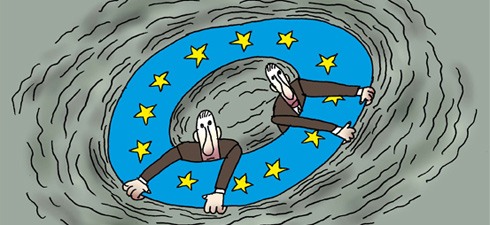The European Union is currently undergoing an anti-democratic coup and nobody seems to object, whether in Portugal or in most other European countries. Only the United Kingdom, which has the oldest and most deeply rooted democracy, is protesting and resisting. Am I exaggerating? I don’t think so. What I call – and I weigh my words – a trans-European coup d'Etat consists in an attempt to violate national sovereignty that is bound to encroach on the checks and balances of the Lisbon Treaty and humiliate national parliaments. The measures in question are sold to the public as crucial progress towards “more Europe” and as a first stab at pan-European “economic governance”. But at no time have the electorates been asked to vote on them – or displayed any desire to do so.
Proceeding on the notion that you never stop on a straight-line trajectory, we’re gearing up now for an outsized leap – that could well cause Europe to collapse, undermined by the irreconcilable disconnect between federalist elites and voters who can hardly relate to the space and rules of the diverse national democracies.
Union fails most vital test of a democracy
There is no overlap between the space in which people believe they have something to say (which, like it or not, is and will remain the space of nation-states) and the space in which more and more decisions are being made, decisions that are increasingly unpopular.
The European Union is failing the most vital test of a democracy: it doesn’t know how to replace its own government by peaceful means. The European Parliament can, of course, dismiss the Commission, but it can’t dismiss the Council, nor does anyone think about who will be the next president of the Commission whilst voting for members of the European Parliament.
Impossibility of increasing European budget
And this mustn’t be mistaken for a minor obstacle, to be overcome with the “boldness”, “courage” and “vision” of supposed European leaders – who, it is said, don’t exist. It’s a central problem, seeing as there is no way to have more political union without more sovereignty transfers, just as there can be no “economic governance” worthy of the name without a genuine European budget.
Now, although we can still hesitate in the face of the symbolic significance of requiring each state to submit its budget first to Brussels (though to whom in Brussels nobody knows) rather than to its national parliament; although we can still live under the illusion that the true heads of the Union are the organs of the Community and not the more powerful ones of its member states (first and foremost Germany); although we wish to ignore the risk that the preponderance of the big states might set off nationalist reactions, what we cannot ignore, on the other hand, is the impossibility of increasing the European budget, because most if not all the states, and their public, will refuse to do so in the short term.
Will European leaders swallow their pride?
The basic problem this crisis has revealed is that, when states lose control over monetary policy, they find they have no way to recover rapidly from a loss of economic competitiveness. Within a monetary union, that can only be done through internal transfers of resources towards regions or countries hit by so-called “asymmetrical shocks”. But for internal transfers to help a region or country out of a crisis, the EU needs to have a far bigger budget at its disposal than the current 1.23% of EU-wide GDP.
Were European leaders to swallow their overweening pride, they’d see that calling in the IMF (or an equivalent institution) has an advantage for the health of European democracies: the interference with national sovereignty involved in an intervention of this sort will always be temporary, in contrast to such definitive sovereignty transfers as are now envisaged.
Crisis is an opportunity
It is true that certain countries (including Greece, Portugal and Spain) have drifted into their present predicament owing to mistakes they made themselves. We might go so far as to say they deserve to be saddled with a watchdog (or more than that) inside their ministry of finance. But the damage caused by the sovereign debt crisis should not have been allowed to trigger such rash reactions, which, contrary to what their advocates claim, are more likely to put off the citizens of the Union than contribute to its consolidation. The EU’s great achievements have always been those of economic integration, and its worst failures have attended its dreams of metamorphosing into a new political power.
We should do well to recall that crises are not only an opportunity to step up the pace on the stretch we have left to go: they are also opportunities to change course.
Was this article useful? If so we are delighted!
It is freely available because we believe that the right to free and independent information is essential for democracy. But this right is not guaranteed forever, and independence comes at a cost. We need your support in order to continue publishing independent, multilingual news for all Europeans.
Discover our subscription offers and their exclusive benefits and become a member of our community now!












